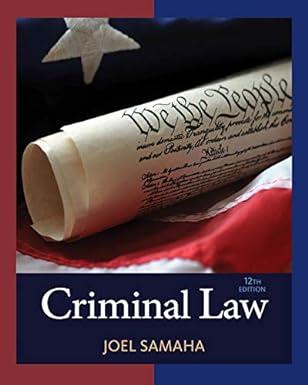Somewhere in Norristown, Pennsylvania, a husbands paramour suffered a minor thumb burn at the hands of a
Question:
Somewhere in Norristown, Pennsylvania, a husband’s paramour suffered a minor thumb burn at the hands of a betrayed wife. The United States Congress— “everywhere extending the sphere of its activity and drawing all power into its impetuous vortex”—has made a federal case out of it. What are we to do? It is the responsibility of “the legislature, not the Court, . . . to define a crime, and ordain its punishment.” And it is “emphatically the province and duty of the judicial department . . . say what the law is.”
Today, the Court shirks its job and performs Congress’s. As sweeping and unsettling as the Chemical Weapons Convention Implementation Act of 1998 may be, it is clear beyond doubt that it covers what Bond did; and we have no authority to amend it. So, we are forced to decide—there is no way around it— whether the Act’s application to what Bond did was constitutional. I would hold that it was not, and for that reason would reverse the judgment of the Court of Appeals for the Third Circuit. . . . Bond possessed and used “chemical[s] which through [their] chemical action on life processes can cause death, temporary incapacitation or permanent harm.” Thus, she possessed “toxic chemicals.” And, because they were not possessed or used only for a “purpose not prohibited,” § 229F(1)(A), they were “chemical weapons.” Ergo, Bond violated the Act. End of statutory analysis, I would have thought......
1. State the elements of the statute Carole Bond was convicted of violating.
2. List all of Carole Bond’s acts and her intent relevant to deciding each of the elements of the crime.
3. Do you believe she violated the statute? Defend your answer.
4. Do you agree that Bond doesn’t belong in prison for a chemical weapons offense? Explain your answer.
5. Who decided to charge Bond with the minor state offense of harassing phone calls and letters instead of the more serious federal chemical weapons offense? According to the Court who should decide? Do you agree? Disagree? Explain your answer.
6. Do you believe this case represents an example of federal government overcriminalization?
7. In your opinion, does this statute violate the place of criminal law in our federal system of government? Explain.
Step by Step Answer:






